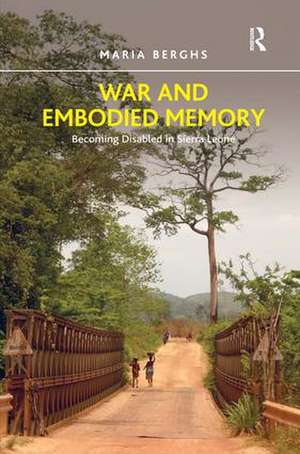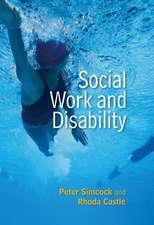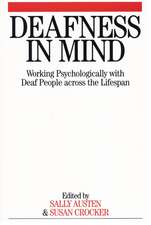War and Embodied Memory: Becoming Disabled in Sierra Leone
Autor Maria Berghsen Limba Engleză Hardback – 13 dec 2012
| Toate formatele și edițiile | Preț | Express |
|---|---|---|
| Paperback (1) | 469.34 lei 6-8 săpt. | |
| Taylor & Francis – 9 sep 2016 | 469.34 lei 6-8 săpt. | |
| Hardback (1) | 1116.27 lei 6-8 săpt. | |
| Taylor & Francis – 13 dec 2012 | 1116.27 lei 6-8 săpt. |
Preț: 1116.27 lei
Preț vechi: 1361.30 lei
-18% Nou
Puncte Express: 1674
Preț estimativ în valută:
213.62€ • 231.96$ • 179.44£
213.62€ • 231.96$ • 179.44£
Carte tipărită la comandă
Livrare economică 23 aprilie-07 mai
Preluare comenzi: 021 569.72.76
Specificații
ISBN-13: 9781409442103
ISBN-10: 1409442101
Pagini: 274
Ilustrații: Includes 2 b&w illustrations and 2 maps
Dimensiuni: 156 x 234 x 18 mm
Greutate: 0.57 kg
Ediția:New ed
Editura: Taylor & Francis
Colecția Routledge
Locul publicării:Oxford, United Kingdom
ISBN-10: 1409442101
Pagini: 274
Ilustrații: Includes 2 b&w illustrations and 2 maps
Dimensiuni: 156 x 234 x 18 mm
Greutate: 0.57 kg
Ediția:New ed
Editura: Taylor & Francis
Colecția Routledge
Locul publicării:Oxford, United Kingdom
Cuprins
Contents: Part I: Setting the scene: locating disability in Sierra Leone; Intersections between anthropology, disability, development and conflict; A general and socio-cultural analysis of impairment and disability; The political background of the creation of disability. Part II: Rebuilding and rehabilitating the nation state: creating national memory and disabled subjectivity?; Rebuilding the social world; Managing life as an individual?; Disability mainstreaming and social activism; Reparations, reintegration and peace; Looking to the future; Appendix; Bibliography; Index.
Notă biografică
Maria Berghs is a Research Fellow in Health Sciences at the University of York, UK.
Recenzii
’In War and Embodied Memory Maria Berghs provides a masterful and scholarly account of the experiences of war-wounded people following the decade-long civil war in Sierra Leone. It is essential reading for students, researchers and academics across all academic disciplines. No one with an interest in the creation of disability, poverty and inequality in the global south should be without it.’ Colin Barnes, University of Leeds, UK ’At times harrowing, at others hopeful, War and Embodied Memory is an important and timely exploration of disability, survival and resistance in post-conflict Sierra Leone. The engaging and accessible multi-layered analysis takes forward our understanding at both macro and micro levels and provides essential insights for anyone with an interest in disability studies, anthropology or global justice.’ Alison Sheldon, University of Leeds, UK 'War and Embodied Memory describes how an amputee and war-wounded community was created after a decade long conflict in Sierra Leone. Beginning with a general socio-cultural and historical analysis of what is understood by impairment and disability, it also aims to explain how disability was politically created both during the conflict and post-conflict, as violence became part of the everyday. Though the book covers vast intellectual ground, it remains compelling and persuasive throughout and effectively contributes essential ideas to studies of disability, post-conflict reconstruction, poverty and anthropology... Her extensive fieldwork in Sierra Leone allows Berghs to provide a compelling and well-rounded approach to conceptualising disability. Preconceptions of the conflict are immediately shed by the reader when Berghs recounts an interview with the frustrated chairman of the Amputee and War-Wounded Association (AWWA), a man whom she explains has dealt with countless outside organisations trying to help. He implores her to, ’Ask us how we survive.’... The depth and scope of Berghs’ res
Descriere
This book describes how an amputee and war-wounded community was created after a decade long conflict (1991-2002) in Sierra Leone. Beginning with a general socio-cultural and historical analysis of what is understood by impairment and disability, it also explains how disability was politically created both during the conflict and post-conflict, as violence became part of the everyday. Despite participating in the neoliberal rebuilding of the nation state, ex-combatants and the security of the nation were the government’s main priorities, not amputee and war-wounded people.


















